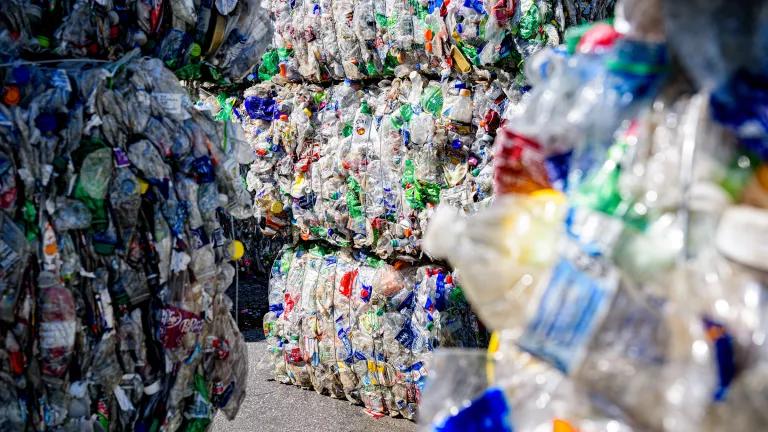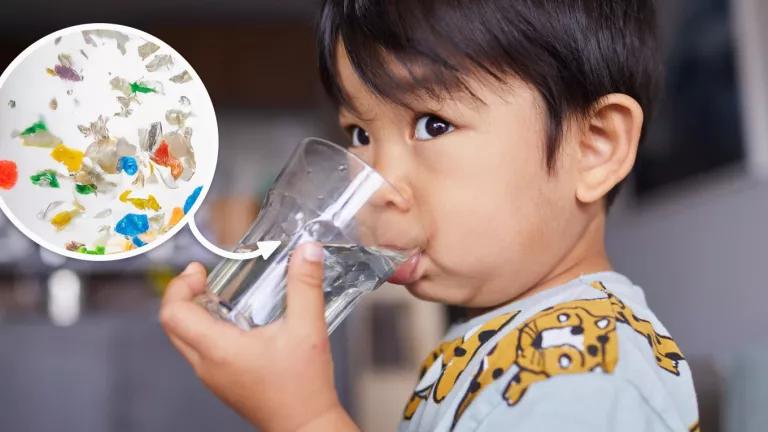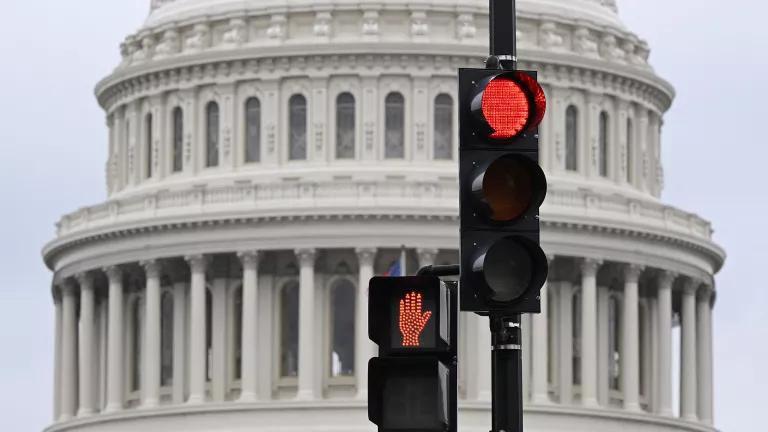240 NGOs to President Biden: Save People from Toxic Plastic
These organizations are urging President Biden to take strong and immediate action, globally and domestically, to address the plastic crisis.

Aaron Hines/City of Greenville, NC
Plastic waste is everywhere, and it’s poisoning people. The fossil fuel industry, seeing a drop in demand for oil and gas as clean energy production ramps up all over the globe, wants to produce even more plastic, and it wants to use unregulated incinerators to convert the waste into highly toxic fuel. The industry calls this “innovation.”
Burning plastic is even worse than it sounds, given all of the toxic chemicals that are used in producing plastic and the hazardous waste and air pollution it generates. The Biden administration must decide: Will it protect the public from plastic pollution or enable the industry to poison people and erode the health of the planet? That’s the choice ahead in the negotiations this week for the global plastics treaty, and as the Biden administration carries out requirements under the Clean Air Act, Solid Waste Disposal Act, and Toxic Substances Control Act.
Thus far, the administration’s actions on plastics pollution have been inconsistent.
Today, 240 organizations sent a letter to President Biden, calling for strong and effective action to reduce plastic pollution and protect the public from the toxic chemicals released through its production, use, and disposal.
Specifically, as the United States and other countries prepare to meet in Nairobi, Kenya, for the next round of negotiations on the global plastics treaty, the organizations ask the administration to:
- Endorse mandatory limits on plastic production and require full chemicals transparency, as well as restrictions on single-use plastics, high-priority chemicals and polymers of concern, and toxic plastic breakdown processes (“chemical recycling”) as part of the global plastics treaty currently being negotiated;
- Discontinue support—including permitting, deregulation, and subsidies—for plastic waste disposal methods that generate hazardous waste, toxic air pollution, and cancer-causing fuel, including gasification, pyrolysis, and other processes, which the plastics industry continues to greenwash as “chemical recycling,” “advanced recycling,” and “molecular recycling”;
- Use the government’s purchasing, research, and regulatory power to reduce plastic production, consumption, and disposal; increase transparency and the public’s right to know about the toxic chemicals used in plastic production and the harmful emissions being released to communities; and promote a just transition to a toxic-free, reuse-based economy.
For years, the chemical industry has been trying to escape regulation under the Clean Air Act for the two types of incinerators—pyrolysis and gasification—that it wants to use to burn plastic. The Trump administration proposed to exclude these incinerators from coverage under the Clean Air Act but never finalized the rule it proposed. Finally, two and a half years later, the Biden administration withdrew it but left the door open to weakening regulations for these technologies in the future.
Now, the industry is pursuing an end run around the Clean Air Act by changing the definition of what counts as “waste” under the Solid Waste Disposal Act (aka the Resource Conservation Recovery Act, or RCRA). If the U.S. Environmental Protection Agency (EPA), or Congress, decides that plastic waste isn’t actually “waste,” then the Clean Air Act controls on those incinerators won’t apply to the plastic being burned in them. Congress and the Biden administration have not supported this, but an army of industry lobbyists is pressuring lawmakers daily to take this step.
When plastic is burned in pyrolysis incinerators, it generates hazardous waste, air pollution, and a final waste product called “pyrolysis oil,” which is itself highly toxic. One of industry’s big (and terrible) “innovation” ideas is to blend the pyrolysis oil with other fossil fuels to make “sustainable fuel,” including aviation and boat fuel. The EPA must review those new chemical mixtures under the Toxic Substances Control Act (TSCA). The agency has already estimated that one such mixture posed a one in four cancer risk, and another posed a cancer risk to everyone who would be exposed, and yet the EPA still approved their production and use, with no additional hazard testing, no meaningful pollution controls, and no public notice.
This action is highly concerning, and it has not been helped by the EPA’s shifting and contradictory explanations. Cherokee Concerned Citizens, a group that lives near the Chevron refinery where the toxic fuels would be produced, has already challenged the approvals in court. We also believe that these approvals violate TSCA. Our letter calls on the administration to revoke approval of all the fuels derived from plastic waste and to cease approving any in the future.
Finally, the letter calls on the administration to stop providing financial support for technologies that convert plastic waste into fuel, or even “recycled” plastic, when the public priorities should be producing less plastic and identifying disposal methods that are the least hazardous and toxic, not the most.
Everyone who is not a lobbyist for the chemical industry knows that the world needs much less plastic, starting with wasteful and destructive single-use plastic and unnecessary packaging. If the planet’s wildlife could talk, especially the creatures living in our oceans, they would beg us to stop destroying the environment with plastic waste. “Do you really need all those single-use straws and plastic cups that are filling the ocean?” No, we don’t. Who among us will raise their hand and volunteer to move into a neighborhood where an incinerator is burning plastic waste (and potentially other things, like PFAS waste) without pollution controls? Nobody from Dow, Chevron, or Exxon signing up? Then why is it acceptable to impose this burden on our fellow citizens, who are already living in neighborhoods overburdened with incinerators, plastic production, and oil refineries?
We are calling on the administration to take these simple but powerful steps:
- Support a strong global treaty that will reduce plastic production and focus on the most highly problematic plastic materials, chemical additives, and plastic products;
- Reject efforts to undermine our foundational environmental and public health laws, including the Clean Air Act, Solid Waste Disposal Act, and Toxic Substances Control Act, and implement those laws as written to protect the public;
- Halt all research, tax credits, subsidies, or any other governmental support for technologies to promote the production, use, or disposal of plastic.
This is a no-brainer for an administration that has already voiced its commitment to scientific integrity and environmental justice.
For more information on the highest-priority plastic materials, chemical additives, and plastic products that need to be phased out, see this blog, and this fact sheet from my colleagues Dr. Veena Singla and Renée Sharp. Senator Jeff Merkley and Representative Jared Huffman have introduced legislation to address the plastic waste crisis—legislation that is not written by the chemical industry—called the Break Free from Plastic Pollution Act.




